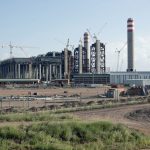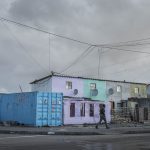Cosatu’s Eskom plan does not pass climate test
The union federation’s proposed plans for Eskom’s transformation are largely a step in the right direction, but they fail on the fossil fuel dependence and climate impact fronts.
Author:
2 March 2020

Eskom’s electricity tariff increases and load shedding are killing South Africa’s economy, while its unsustainable debt levels threaten to tank the National Treasury. Its polluting coal power is killing people through air and water pollution. And, as the biggest greenhouse gas polluter on the continent, it is also responsible for death and devastation across the world through its oversized contribution to the climate crisis.
Until now, we seem to have been stuck in a political stalemate, with no feasible path forward to address the interconnected electricity, debt, climate and pollution crisis that is Eskom.
The Congress of South African Trade Unions (Cosatu) has put forward a bold proposal that, by way of an overview, proposes a social compact between government, labour and industry to “stabilise and save” Eskom. The proposal aims to set us on a path out of Eskom’s coal-fired debt crisis to a socially owned future in which Eskom will lead the way in building renewable energy. To do so, it aims to create a special-purpose finance vehicle that will fund a just transition to a renewable energy future.
Related article:
Cosatu proposes that funding for the special-purpose vehicle should come from the Public Investment Corporation and development finance institutions like the Development Bank of Southern Africa and the Industrial Development Corporation. The special-purpose finance vehicle would fund both a just transition to renewable energy and help reduce Eskom’s debt from its staggering R454 billion to a more sustainable level of R200 billion.
Cosatu’s proposal echoes an earlier one by President Cyril Ramaphosa’s Eskom Sustainability Task Force, which sought international funding to create a similar special-purpose vehicle. Unions worried that seeking foreign capital would come with strings attached to unbundle Eskom, which they saw as leading to its privatisation. As such, Cosatu’s proposal comes with two non-negotiables: Eskom would not be privatised and jobs would not be lost.
The good steps forward
From a climate justice perspective, there is a lot to celebrate. For too long Eskom has been wedded to coal, making it the biggest polluter on the continent. Cosatu is calling for a new Eskom and for its generation mandate to be expanded by the energy minister to allow it to increase its own renewable energy generation capacity. The union federation is also calling for relevant investment in battery storage to support renewable energy. It also wants worker- and community-owned generation capacity to be increased, and says targeted public and private investments should be made to produce renewable energy technology locally, particularly in provinces where workers and communities are at risk from the shift away from coal.
Another major step forward is to require that all buildings should install locally produced solar panels over a five-year period. Doing so will reduce pressure on Eskom, lower carbon footprints, consumer and industry electricity bills, and boost the local solar panel-producing industry. Furthermore, Cosatu proposes that indigent households and small, medium and micro enterprises should qualify for subsidies or rebates for the installation of solar panels. Its support of indigent households also goes further, arguing that the free electricity allocation to indigent households should be increased. From a pro-poor perspective, this is all a welcome development.
Related article:
A key provision in the proposal is ensuring that there is a just transition for workers and communities who will be affected by the transition to renewables. Not just workers but families, businesses and communities are reliant on the income and job creation which the coal industry provides. To avoid adding to South Africa’s unemployment crisis, a just transition plan would be put in place to protect and invest in these workers and communities.
How just the transition Cosatu is calling for really will depend on how the details of the plan are fleshed out and then implemented. As 350Africa.org has explored, the just transition has become somewhat of a buzzword, so we need to be careful about what gets passed off as just. We do not want to mistake “just a transition” for “a just transition”. However, although the details of the just transition plan need to be fleshed out, it is good that Cosatu is calling for one.
Related article:
To further ensure job creation opportunities for those impacted by the transition, Cosatu’s proposed special-purpose vehicle would leverage public and private investments for renewable energy. Priority would go to provinces like the Eastern Cape, Mpumalanga and Limpopo, which would be most impacted in the transition given their heavy dependence on coal. An additional benefit is that places like Mpumalanga and Limpopo already have significant grid and distribution capacities to feed new renewable energy into the grid.
Another positive proposal by Cosatu is the development and implementation of electric vehicle production “to protect the auto-manufacturing sector, create new jobs, exceed climate change targets but also to provide a mass sustainable demand base for Eskom”. This is a welcome development and should be coupled with major nationwide investments, incentives and infrastructure development to support sustainable mass electric transit in the form of electric buses, taxis and trains.
The bad steps backward
On the negative side for the climate, Cosatu’s proposal calls for extending the lifespan of existing coal power stations by converting them to gas where possible. This proposal is problematic from both an environmental and economic standpoint. From the latter, renewable energy is the cheapest form of energy available in South Africa.
Renewables are becoming so cheap that even in the United States, which has the lowest gas prices globally, it is cheaper to build new renewables with storage than new gas plants. Studies show that by 2035 it will be cheaper to build new renewables with storage than it will be to run existing gas plants. In other words, gas power plants will be uneconomic, stranded assets not even worth running.
From an environmental perspective, gas plants are problematic for a number of reasons. First, we may need to frack for gas, which means using massive amounts of water in a country that is reeling from a crippling drought – a drought that the climate crisis is set to deepen.
Related article:
Adding fuel to the climate fire, fracking also releases vast amounts of methane in the process, which undermines the climate benefits of moving from coal to gas. There is controversy about when and whether gas is worse than coal, but what is not controversial is that gas is much worse for the climate than renewable energy.
In South Africa, research shows that transitioning to almost 100% renewable energy by 2050 would make our energy system more reliable (no more load shedding), and it could create an additional 200 000 jobs by 2035. We could also lower the cost of energy by 25%, save 196 billion litres of water a year, and remove our biggest source of air, water and greenhouse gas pollution.
Why would we want to massively ramp up gas when a renewable energy future provides more jobs and affordable energy, and does not pollute our air and water? Additionally, where gas may be required to balance the grid, we could work to source it from biogas from municipal sewage plants, green renewable-energy produced hydrogen, and other renewable sources.
Related article:
Worst of all, Cosatu seems to have already succumbed to the pressures of the coal lobby. While its initial proposal included no mention of new coal, political intervention seems to have pushed it to include references to the need for “clean coal” in later proposals. There is no such thing as clean coal, though, as Cosatu itself once realised.
Coal is never really clean, as vast air and water pollution levels are inherent to the process of mining and burning coal, despite technologies that can make them slightly less polluting. And technologies that attempt to make coal climate-friendly by capturing and storing carbon emissions have proven prohibitively expensive and technically limited. They are simply not viable.
Pressuring Cosatu for a better future
The climate science is clear that we cannot afford new coal. Rather we must rapidly phase it out. From an economic perspective, coal has become uncompetitive compared with cheap renewables, hence the reason banks are fleeing from coal. Like United States President Donald Trump and Gwede Mantashe, the minister of minerals and energy, Cosatu’s continued advocacy for the lie of clean coal is simply uneconomical and exposes future generations of South Africans to more pollution and climate destabilisation.
So, unfortunately, while Cosatu’s proposal does a lot of good to unlock renewables, it is just not good enough from a climate justice and economic perspective. We need to be putting South Africa on a rapid trajectory to a renewable energy future, not locking us into further dependency on uneconomic and environmentally deleterious coal and gas plants.
Last year, the National Planning Commission (NPC) convened a national stakeholder dialogue on a just transition. Citizens across the country came to the agreement that South Africa should be aiming for net zero carbon emissions by 2050. Such a target is also in line with South Africa’s fair share of climate action to keep warming to 1.5°C as agreed under the Paris Climate Agreement. As such, Cosatu’s proposal contradicts the Paris Agreement and the NPC’s vision of a just transition.
Related article:
While Cosatu’s proposal ultimately fails from a climate justice perspective, it has many positive elements which can be built upon. And it is good that the union federation says it is still open to receiving input on its proposal. Perhaps, with some strategic pressure, civil society may be able to push it to move in the right direction towards climate justice.
Last year, climate justice activists stood together with the South African Federation of Trade Unions demanding a just transition to a socially owned renewable energy future. Civil society will work best with Cosatu if it shifts away from supporting the dependence on fossil fuels and instead advocates for the adoption of climate-friendly power-generation models.
If we are to save Eskom, we will need to eventually come together and advocate for a just transition to renewable energy. If we succeed, we can unlock a future that costs less, creates jobs and is less water intensive, and which provides a more stable energy system that no longer pollutes our air, soil and water, all while stabilising our climate.






